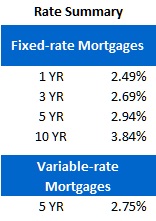David Larock in Mortgages and Finance, Home Buying, Toronto Real Estate News
To my surprise, Government of Canada (GoC) bond yields (on which our fixed-mortgage rates are based) did not drop last week.
Here are five guesses as to why demand for GoC bonds didn't increase:
- The European Central Bank (ECB) has recently intensified its rhetoric about supporting the euro at all costs. If investors believe that ECB President Mario Draghi can and will do whatever it takes to save the euro zone, then the safety premium they are willing to pay for safe-haven assets, like GoC bonds, will be reduced.
- The Loonie has risen above par with the Greenback. Given that the majority of foreign investors who are buying GoC bonds are American, when our exchange rate with the U.S. rises it makes our bonds relatively more expensive. This reduces their already low yields further and makes them a comparatively less attractive option.

- GoC bonds have to compete with other forms of investment and there seems to be some renewed investor optimism around equities (specifically U.S. equities) as an asset class. If U.S. investors are more bullish on equities, they will sell bonds and buy stocks. Insofar as this creates more sellers of GoC bonds than buyers, bond yields will drop until the demand/supply equilibrium is restored.
- Further to that point, investor psychology is a powerful force and CIBC economist Benjamin Tal predicted last week that in the near future, markets would react “more positively to good news and less negatively to bad news” because investor expectations are now so low. If true, that sentiment will give our bond yields an upward bias.
- Bank of Canada Governor Mark Carney continues to warn Canadians that he may raise the overnight rate and remove some monetary policy stimulus sooner than they expect. Last week in London he said: “Our economy’s almost back at full capacity, the labour market’s been growing, we’re growing above - we had been growing above trend, and the extent to which we continue to grow above trend, we may withdraw some of that monetary policy stimulus.” Investors may be reluctant to bet against statements made by the man in charge of our monetary policies.
While I can see some validity in all of the above arguments, I still believe that our bond yields will fall from their current levels. Here are my counter-arguments to the points listed above:
- The ECB’s President Mario Draghi does not enjoy anything close to the kind of unilateral authority he needs to back up his tough talk with commensurate action (i.e. purchasing sovereign bonds directly, instituting pan-European deposit insurance, and/or ultimately, creating a euro bond). When the next stage of the euro-zone crisis hits (and it will), the ECB will be watching their game-changing rescue plans wend their way through the seventeen parliaments of the euro zone’s member countries while Rome burns.
- A higher Loonie does lower the relative return that U.S. investors can earn on GoC bonds, but it also makes our exports to the U.S. more expensive and as such, has a significant dampening effect on our economic growth. Slower growth rates will reduce the likelihood of inflation, and by association, higher interest rates.
- I don’t think the increased bullishness around equities is based on fundamentals. Instead, in today’s down-is-up world of investing, I think investors are betting that bad news will translate into more stimulus and in particular more quantitative easing by the U.S. fed. If that happens, the thinking goes, investors won’t want to miss out on the ensuing market bounce (like the one they got after QE1). But the experts I read note that subsequent U.S. fed stimulus produced a much more muted and temporary effect, in large part because it was expected by the market (as it is now).
- Mr. Tal is right that the years of sideways markets have lowered the bar of investor expectations to the point where there is much more room over it than under it. If we continue to muddle along, then I agree with his theory. But my view of the world includes a deepening euro-zone crisis (we haven’t even started talking about France yet), a long period of slow growth for the U.S. economy, and an as yet under-appreciated risk of a hard landing in China. When the next crisis hits, investors will care more about the return of their capital than the return on their capital.
- BoC Governor Carney has been warning about higher borrowing rates for some time now but it’s hard to imagine how he could raise the BoC’s overnight rate in the current economic environment. If “growing above trend” means GDP growth in the 2% range, tepid and inconsistent job-creation rates and average income growth that is barely keeping pace with inflation, we should be able to grow above trend for a long time before our economy reaches its full capacity as he predicts. When you factor in the numerous external headwinds acting against our economic momentum, Mr. Carney’s comments sound much more like an attempt to keep Canadians focused on reducing debt rather than a heartfelt prediction from a very wise man.
Government  of Canada (GoC) five-year bond yields were 2 basis points lower for the week, closing at 1.36% on Friday. While the five-year yield was flat on an overall basis, this end result masked a sharp increase on Monday followed by a four-day decline - so the trend going into this week is clearly to the downside. Several lenders raised their five-year fixed rates back above 3% last week in response to the previous yield run-up but borrowers who know where to look can still find sub-3% five-year rates available.
of Canada (GoC) five-year bond yields were 2 basis points lower for the week, closing at 1.36% on Friday. While the five-year yield was flat on an overall basis, this end result masked a sharp increase on Monday followed by a four-day decline - so the trend going into this week is clearly to the downside. Several lenders raised their five-year fixed rates back above 3% last week in response to the previous yield run-up but borrowers who know where to look can still find sub-3% five-year rates available.
Variable-rate mortgage discounts were unchanged for the week, and borrowers considering this option are well advised to consider shorter-term (and cheaper) fixed rates as an alternative.
The Bottom Line: While the recent trend toward higher GoC yields may continue over the short term, for the reasons listed above I still believe that they will return soon enough to their previous ultra-low levels. If that happens, our mortgage rates will stay low for the foreseeable future.
David Larock is an independent mortgage planner and industry insider specializing in helping clients purchase, refinance or renew their mortgages. David's posts appear weekly on this blog (movesmartly.com) and on his own blog integratedmortgageplanners.com/blog). Email Dave




